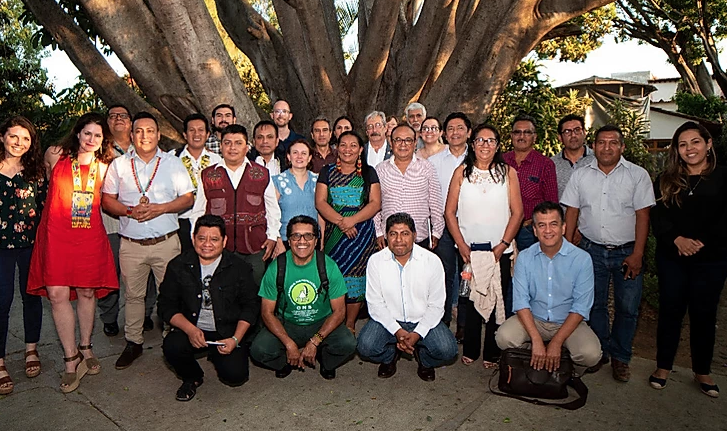Workshop focuses on greater support for Indigenous communities in forest protection
The Global Committee for Indigenous Peoples & Local Communities (IP/LC) gathered last week in Oaxaca, Mexico to strategize on ways to increase collaboration among and between IP/LC groups and local governments on climate action. Topics dicussed over the course of the two-day workshop included questions of governance, identifying priorities, and the Committee’s role in educating IP/LC communities on forest and climate initiatives.
Earth Innovation Institute (EII) provided early support to the creation of the Committee, formed as part of the Governors Climate and Forests (GCF) Task Force, and was represented at the Oaxaca meeting by Elsa Mendoza, who leads EII’s program in the State of Acre, Brazil.

She says the March 3-4 workshop provided an opportunity for participants to gain a better understanding of recent initiatives, including California’s endorsement of the Tropical Forest Standard (TFS).
“It was an important starting point in the conversation about the Standard and its relevance for these communities,” said Mendoza, who has spent the past two decades supporting greater collaboration between Indigenous peoples and local governments in Acre.
“This was an opportunity for many of these community leaders to learn about the potential benefits that could flow to them through the California Standard and to understand its emphasis on ensuring indigenous rights,” she noted, adding participants will take this knowledge to their respective regions.
The Tropical Forest Standard was endorsed by the California Air Resources Board in 2019 during a hearing in Sacramento that drew Indigenous leaders from across Latin America, Indonesia and other tropical regions in a strong show of support. The Standard lays out a set of criteria that tropical jurisdictions must meet in order to be eligible to sell carbon credits on the increasingly lucrative global carbon market.
A key component of the standard is recognition by jurisdictions—states, provinces and other “subnational” governments in tropical forest regions—of the Guiding Principles of Collaboration and Partnership Between Subnational Governments, Indigenous Peoples and Local Communities. This is the first set of global principles that outlines ways regional governments can collaborate with IP/LC groups on climate mitigation strategies while addressing issues of rights, livelihoods and participation.
There are an estimated two-hundred million “forest peoples” globally. These groups, which include indigenous and forest-dependent communities among their ranks, are at the forefront of efforts to protect the world’s tropical forests, which play a pivotal role in reducing emissions and slowing climate change.
Mendoza is currently working with the broader EII team to support regional GCF committees in implementation of the Principals.
But she says challenges remain in ensuring IP/LC groups are meaningfully engaged by regional governments as they draw up their mitigation plans. These include changes in administration at the local, state and national level that can often leave commitments by previous administrations behind. There is also the fact that many of the more influential IP/LC groups are organized at the national level, making coordination at the state and regional level more complicated.
“Many of them worry that having a dialogue with the state government could dilute their influence at the national level,” explained Mendoza, stressing that more needs to be done to address the concerns among IP/LC groups and to ensure they are engaged in the process.
The California Air Resources Board’s Jason Gray was among those in attendance at the workshop, where Committee members formalized the acceptance of California as a member. The Committee was initially conceptualized on Yurok Tribal lands in Northern California in 2017 during an inaugural workshop coordinated by EII and GCF and supported by the Environmental Defense Fund and Forest Trends.
Representatives from pan-regional Indigenous organizations including the Mesoamerican Alliance of Peoples and Forests (AMPB) and the Coordinator of Indigenous Organizations of the Amazon Basin (COICA) were present at the workshop, alongside representatives from each of the four major GCF Task Force regions (Brazil, Peru, Mexico, and Indonesia).
